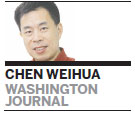 To Wu Shicun, a leading Chinese scholar on the South China Sea, much of the heat China receives on the sea's contentious issues is due to many countries not being used to an increasingly strong China.
To Wu Shicun, a leading Chinese scholar on the South China Sea, much of the heat China receives on the sea's contentious issues is due to many countries not being used to an increasingly strong China.
Wu, president of the National Institute for South China Sea Studies, believes it's a good thing when viewed from another perspective. "No one talked much about China 20 years ago, because China did not play as big a role on the global stage," he said.
Now Americans are worried that China will catch up with the United States, at least economically, and "they cannot accept that", he told reporters on Tuesday on the sidelines of the fifth annual South China Sea Conference held by the Center for Strategic and International Studies in Washington.
Wu, who was attending the conference for the third time, described the sea issue as no longer a dispute between China and other claimants, but rather a wrestling match between China and the US for geopolitical advantage in the region.
He asked Daniel Russel, the US assistant secretary of state for East Asian and Pacific affairs, who was delivering a keynote speech at the seminar, if the US has been taking sides on the issues.
A similar question was raised by a reporter from a Taiwan-based TV network as to why the US has been quiet when other claimants build facilities on the disputed isles but noisy when China does the same thing.
Most Chinese don't see the US as being neutral on the South China Sea dispute when some of the region's claimants are treaty allies the US has sworn to protect.
US Assistant Secretary of Defense David Shear admitted in a Senate hearing in May that in the Nansha (Spratly) Islands, Vietnam had 48 built outposts, the Philippines eight, the Chinese mainland eight, Malaysia five and Taiwan one.
Sienho Yee, professor of international law and chief expert at the Wuhan University Institute of Boundary and Ocean Studies, said that what the Chinese government has been doing is basically in response to activities and military exercises by other countries in the region.
He dismissed the argument about freedom of navigation by saying that of the $5 trillion in trade going through the South China Sea, most has involved trade with China.
Yee said China likes to provide for the public good to ensure security and safety and also protect its own interests.
He accused the US of abusing its claimant rights of navigational freedom. "And this is very dangerous," he said.
Russel cited a combination of factors as having made the Chinese land reclamation unique, such as the scale of reclamation, its speed, the potential capability to project military power and the intention.
"These are among the factors that, in the eyes of the region certainly, and by extension in the eyes of the United States, constitute a qualitative difference between what the Southeast Asian claimants have done in the past with what China is currently doing now," he said.
Russel repeatedly mentioned the UN Convention on the Law of the Sea, known as UNCLOS, and said every US administration has supported it since 1994, but Randy Forbes, a Republican congressman from Virginia, said there are concerns on Capital Hills regarding UNCLOS.
"I don't know if there is consensus in the Congress to support the law of the sea now," he said during a lunch keynote speech.
While Russel and other speakers from the US, the Philippines and Vietnam played a blame game with China, Wu said the South China Sea situation has been generally stable and controllable.
He noted that there is growing uncertainty from land reclamation, where China is a late comer, and also from the US military surveillance and patrol near the Nansha Islands, which contributes to the growing tension.
Wu cited activities conducted by extra-regional powers, such as Japan taking a stronger military posture in the region and in the South China Sea; the unilateral actions by claimant countries; and the slow progress in the consultation process of a code of conduct as contributing to the uncertainties.
Wu applauded the codes for unplanned military encounters at sea between China and the US as a good confidence-building mechanism between the two countries.
Stapleton Roy, a former US ambassador to China who was in the audience on Tuesday, said that he heard some good ideas. "There needs to be progress on negotiating the code of conduct," he said.
"I like the idea about a consultation mechanism on maritime matters. To some extent, this is consistent with measures Xi Jinping is taking when he says disputes ought to be settled through negotiation, not use of force, and territorial disputes should be handled in a proper way.
"I think that's the right approach," Roy said.
chenweihua@chinadailyusa.com